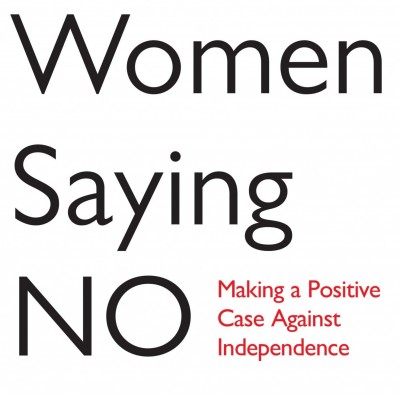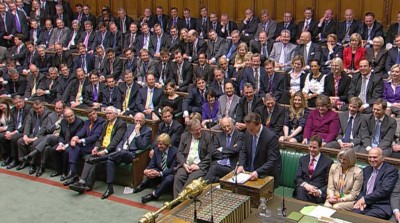Engender blog
Guest blog: Women Saying No (Indyref Thursday #8)
 This week's final indyref Thursday is a double page special from two former politicians who have been out on the campaign trail. They describe what they believe their vote will mean for women.
This week's final indyref Thursday is a double page special from two former politicians who have been out on the campaign trail. They describe what they believe their vote will mean for women.
Maria Fyfe is a former Labour MP for Glasgow Maryhill
I know women who are voting Yes because they want a fairer and more equal society. I completely agree with their aim, but where is the capacity to achieve it? It doesn’t happen just because enough people put a cross against Yes on a ballot paper. We can all be emotionally aroused by stirring speeches. But one of the wisest pieces of advice I ever heard was, “Never mind what politicians say. Look at how they spend the public’s money and then you know what they really care about.” I could add to that, what they tax and who gets tax cuts.
Guest blog: Women and work: what next? (Indyref Thursday #7)
 In the run-up to the referendum, we'll be publishing views on women's equality and Scotland's constitutional futures. This week, Close the Gap development officer Lindsey Millen writes on the implications of the referendum for the women and work.
In the run-up to the referendum, we'll be publishing views on women's equality and Scotland's constitutional futures. This week, Close the Gap development officer Lindsey Millen writes on the implications of the referendum for the women and work.
After months of campaigning, discussion and debate, what is arguably the biggest political event of a generation is almost upon us. With just over two weeks to go until the referendum, Close the Gap launched a new working paper ‘Women and work: What comes next in a post-referendum Scotland?’ at a Constitutional Café event with Engender, Electoral Reform Society Scotland, and Scottish Women’s Aid last Saturday. The aim of this paper is to provide an overview of the implications for women and work in the context of the independence debate, to describe what needs to happen to effect positive change, and to identify the levers that are available in the event of either outcome.
We already know women face a multitude of barriers and inequalities in the labour market. The gender pay gap remains stubbornly high at 13% in a labour market characterised by persistent occupational segregation, with women clustered into low-skilled, low-valued, and low-paid work at one end of the scale, and denied access to the top roles at the other. Women overwhelmingly shoulder the burden of care, for children, older people and disabled people, and often find themselves faced with downward occupational mobility on returning to work after maternity or other care leave.
Guest blog: Indyref, women and politics (Indyref Thursday #5)
 In the run-up to our event on 'gender equality, the referendum and beyond', we'll be publishing a weekly blog to correspond with our 'Scotland's futures' briefing papers series. This week, guest blogger Ann Henderson considers gender implications in terms of politics and power.
In the run-up to our event on 'gender equality, the referendum and beyond', we'll be publishing a weekly blog to correspond with our 'Scotland's futures' briefing papers series. This week, guest blogger Ann Henderson considers gender implications in terms of politics and power.
When reviewing the statistics for political representation for women in the UK and in Scotland, we have rightly been proud of the progress made when the Scottish Parliament was established. In 1999 our Parliament sat 4th in the world rankings on parliamentary representation, with 37.2% of our new Parliamentarians being female.
Guest blog: Indyref and violence against women (Indyref Thursday #4)

By Marsha Scott
In the run-up to our event on 'gender equality, the referendum and beyond', we'll be publishing a weekly blog to correspond with our 'Scotland's futures' briefing papers series.This week, guest blogger Marsha Scott considers implications in terms of violence against women.
Violence against women (VAW) is one of the feminist “Big 3”, alongside women’s poverty and women’s power deficit in public life. The policy context for VAW is perhaps the most devolved, the most significant exception being the no-recourse-to-public-funds rule, which prohibits provision of public assistance for women with uncertain immigration status. It is hard to imagine a post-referendum government in London in the near future that will either change this rule or allow Scotland to make its own rules about eligibility for public benefit. Scottish administrations have demonstrated some political interest in redressing the no-recourse problem in the face of constraints under the Scotland Act, and one could argue that attitudes toward immigrants and immigration policy are likely to support an improved prospect should Scotland vote yes in the referendum.
Guest blog: Childcare provision and the independence referendum (Indyref Thursday #3)
By Craig McAngus
This guest blog by Craig McAngus was originally posted on the Scottish Centre on Constitutional Change website. He is currently researching the implications of constitutional change for gender equality.
The 18th of September is fast approaching and the two main campaigns are stepping up their efforts to try and shore up their own vote whilst appealing to the undecided. One particular group that has been catching the attention of both the psephologists and the campaigns alike is women. Still more likely to be undecided, the women of Scotland have become a key group of voters that may yet hold the key to the result we wake up to (or stay up for) on the 19th of September. The Scottish Government has been accused by its opponents of trying to lure women into voting Yes with policy ‘bribes’ such as extended childcare and alleged ‘token gestures’ like bringing more women, namely Shona Robison and Angela Constance, into the cabinet. However, advocates of Yes argue that Scotland can become a more gender equal place after independence through measures such as ‘transformational’ childcare. However, little is known about what voters think about these issues.
Downloads
 Engender Briefing: Pension Credit Entitlement Changes
From 15 May 2019, new changes will be introduced which will require couples where one partner has reached state pension age and one has not (‘mixed age couples’) to claim universal credit (UC) instead of Pension Credit.
Engender Briefing: Pension Credit Entitlement Changes
From 15 May 2019, new changes will be introduced which will require couples where one partner has reached state pension age and one has not (‘mixed age couples’) to claim universal credit (UC) instead of Pension Credit.
 Engender Parliamentary Briefing: Condemnation of Misogyny, Racism, Harassment and Sexism
Engender welcomes this Scottish Parliament Debate on Condemnation of Misogyny, Racism, Harassment and Sexism and the opportunity to raise awareness of the ways in which women in Scotland’s inequality contributes to gender-based violence.
Engender Parliamentary Briefing: Condemnation of Misogyny, Racism, Harassment and Sexism
Engender welcomes this Scottish Parliament Debate on Condemnation of Misogyny, Racism, Harassment and Sexism and the opportunity to raise awareness of the ways in which women in Scotland’s inequality contributes to gender-based violence.
 Gender Matters in Social Security: Individual Payments of Universal Credit
A paper calling on the Scottish Government to automatically split payments of Universal Credit between couples, once this power is devolved to the Scottish Parliament.
Gender Matters in Social Security: Individual Payments of Universal Credit
A paper calling on the Scottish Government to automatically split payments of Universal Credit between couples, once this power is devolved to the Scottish Parliament.
 Gender Matters Manifesto: Twenty for 2016
This manifesto sets out measures that, with political will, can be taken over the next parliamentary term in pursuit of these goals.
Gender Matters Manifesto: Twenty for 2016
This manifesto sets out measures that, with political will, can be taken over the next parliamentary term in pursuit of these goals.
 Scottish NGO Briefing for UN Special Rapporteur on Violence Against Women
Joint briefing paper for the UN Rapporteur on Violence Against Women.
Scottish NGO Briefing for UN Special Rapporteur on Violence Against Women
Joint briefing paper for the UN Rapporteur on Violence Against Women.

Newsletter
Sign up to receive our newsletter here:
Sign up to our mailing list
Receive key feminist updates direct to your inbox: